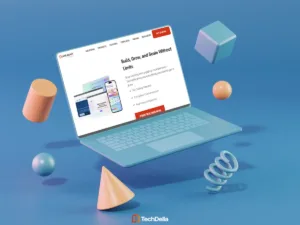Selling digital products online is one way to make passive income in 2024. Once you know the top-selling digital products and implement the right eCommerce marketing and eCommerce sales strategies, you can make a lot of money from selling digital products.
You may or may not need to have a brick-and-mortar store to sell a digital product online. However, with a simple digital product website or even a social media account, you can start making money selling digital products online.
But what are digital products? From your favorite eBook to premium graphics design templates (you don’t have to learn how to become a graphics designer before selling this), digital products are intangible products that a consumer needs to make their life easier.
To be honest, selling digital products is one of the easiest ways to make money online today. Digital products are relatively easy to create and are reusable. You can even start a reseller program for your digital products.
Understanding what is a digital product will make it easier for you to conceive the right digital product ideas to sell online. Let’s answer the question that brought you here: What is a digital product?
Read more about PLR Digital Products and Their Best Websites
What are Digital Products?
Digital products are goods or services that are delivered and consumed in digital format. This delivery is typically through electronic means such as the internet or other digital channels.
Unlike physical products, digital products exist in a non-tangible form and can be easily distributed, replicated, and delivered to consumers electronically.
Some digital products can be converted to physical products, an example is a printable product.
Once upon a time, you’d probably need to work in a bookstore to buy a workbook or a calendar. Now, you can buy these products online.
But did you ever think that it was someone who created these digital products? Yes, and that person is making a lot of money selling those digital products online – sweet passive income generator!
Now, digital products can also be services. From cloud storage solutions and Software as a Service (SaaS business models) applications to eCommerce marketing tools and SEO solutions, these digital services fall under the digital products category.
When creating a digital product to sell, always keep your consumer in mind. Don’t create a digital product just for the sake of making money – this is a surefire way to fail.
Make sure you identify the needs of your target customers and create a unique product that can fulfill those needs. This is the only way to be successful in your digital product business.
How to Make Money Selling Digital Products
So, can you make money with digital products? Of course! However, making money from your digital products depends on your business model and the type of digital products you want to sell. The goals of your business also matter.

One prevalent approach is the eCommerce business model, where businesses engage in direct sales. Through online platforms or dedicated websites, customers make one-time purchases to gain access to a diverse array of digital offerings.
You can also try the subscription business model approach. Here, you can make money on a recurring basis. This is a great way to have a steady stream of income.
Another way to make money from your digital product is through affiliate marketing. With this model, you allow affiliates to promote a product and earn commissions for each generated eCommerce sale.
Depending on the type of digital product you choose to sell, you can incorporate an eCommerce business model, a dropshipping business model, or even a SaaS business model. This will make it easy to tailor your digital marketing strategies and grow your digital product business.
Learn how to start a SaaS business here.
Why Sell Digital Products vs Physical Goods?
Selling digital products versus physical goods offers distinct advantages and considerations. You need to know that the choice between the two depends on various factors such as the nature of the product, target audience, business model, and overall strategic goals.
Here are some reasons why businesses might choose to sell digital products:
- Production and Distribution
Creating and delivering digital products often involves lower production and distribution costs. When you compare this to manufacturing, packaging, and shipping physical goods, the overhead cost for physical products is way higher. This can lead to higher profit margins for digital products.
- Immediate Access
Digital products can be delivered instantly to customers upon purchase. With just a click of a button, your customers can get their products. This immediate access enhances customer satisfaction and eliminates the need for shipping, reducing the time between the transaction and product consumption.
- Recurring Revenue
Another great advantage of digital products over physical products is that digital products lend themselves well to subscription models. This means your business can establish a steady and predictable revenue stream – think Netflix, Spotify, or Monday.com.
- Wider Audience
You can easily distribute digital products globally without the logistical challenges associated with physical goods. So, your business can reach a broader audience and tap into international markets.
- Educational Value
Digital products are well-suited for sharing information, knowledge, and educational content. E-books, online courses, and digital tutorials can be powerful tools for disseminating expertise and building authority in a particular domain.
Differences Between Physical Goods and Digital Products
Here’s a table summarizing the differences between physical goods and digital products:
Criteria | Digital Products | Physical Goods |
Instant Delivery and Accessibility | Immediate access upon purchase or subscription | Longer delivery times and shipping processes |
Global Reach and Scalability | Easily distributed globally without constraints | International shipping may be costly and complex |
Lower Overhead Costs | Lower production and distribution costs | Higher costs due to manufacturing and logistics |
Ease of Replication and Updates | Easily replicated and updated for improvements | Changes involve complex manufacturing processes |
Environmental Impact | Lower environmental impact – minimal waste | Potential environmental concerns with materials |
Reduced Risk of Obsolescence | Less risk of obsolescence – updates are seamless | Risk of obsolescence with changes in consumer trends |
Flexible Business Models | Enables diverse models (subscriptions, freemium) | Limited flexibility compared to digital models |
Read more about Where To Sell Digital Products
Types of Digital Products to Sell
Digital products come in various types, catering to different needs and preferences in the digital age.
Here are some common types of digital products:
- Software and Applications
- Ebooks and Digital Publications
- Digital Music and Audio (e.g., Podcasts, Audiobooks)
- Digital Videos and Streaming Services
- Online Courses and E-Learning
- Digital Art and Design Assets
- Subscription Services (e.g., Streaming, SaaS)
- Webinars and Virtual Events
- Digital Photography (e.g., Stock Photos, Digital Prints)
- Mobile Games and Gaming Content
- Subscription Boxes (Digital)
- Digital Marketing Services (e.g., SEO Services, Social Media Management)
Read more about 13 Profitable Digital Products To Sell Online
Digital Products Examples
Here are some digital product examples online:
- Microsoft Office Suite
- Adobe Creative Cloud
- Kindle eBooks
- Digital issues of The New York Times
- Reports and whitepapers in PDF format
- Spotify (music streaming)
- Audible (audiobooks)
- Podcasts on platforms like Apple Podcasts or Spotify
- Netflix (streaming movies and TV shows)
- YouTube Premium (ad-free videos)
- iTunes (digital movie purchases)
- Coursera courses
- Udemy online classes
- Skillshare tutorials
- Shutterstock (stock photos)
- Adobe Stock (graphics and illustrations)
- Google Fonts (digital fonts)
- Candy Crush (mobile game)
- In-app purchases in Clash of Clans
- Digital game downloads on Steam
- Moz (SEO software)
- Hootsuite (social media management)
- Google Ads (online advertising platform)
Frequently Asked Questions About What Are Digital Products
Ready to Begin?
Every business venture is an investment. Just like investing in stocks online or investing in gold online, it is important that you do a lot of research.
Selling digital products is very lucrative, but if you don’t have the right knowledge and tools, a lot of things can go wrong. Make sure you understand more than the basics of selling digital products.
Whether you choose to create the digital products yourself, dropship digital products, or sell PLR digital products, always remember to put your customers first. Put the best customer management strategies in place.
While it’s great to have a solid marketing strategy, remember that customer acquisition is more expensive than customer retention. Once your customers are happy, then your digital product business will surely succeed.
The Techdella team writes about startup marketing strategy, growth tactics, and what actually works when you're building a company with real constraints.
Get it in your inbox
One email a week. Real startup marketing insights — no filler.
Join 1,400+ founders. Unsubscribe anytime.
You're in!
Thanks for subscribing. Your first issue will arrive shortly.



